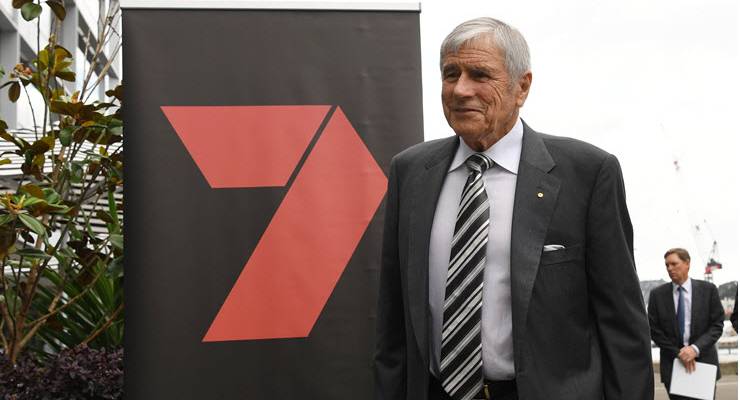
Is Western Australia’s environmental watchdog afraid of Kerry Stokes? It’s a question being asked by environmental groups after a company backed by the billionaire got a step closer to a gas development with a tick of approval from the Environmental Protection Authority (EPA).
The Waitsia project attracted controversy in August after it was the only one in the state to be granted an exemption from tough new restrictions on gas exports out of WA to the eastern states and overseas. WA Premier Mark McGowan walked out of a press conference instead of answering questions about whether he had spoken to Stokes about the matter.
And last month the project, which is a joint venture between Stokes-backed Beach Energy and Japanese company Mitsui and Co, was handed another win: environmental approval from the independent regulator amid concerns most pollution from the project has been overlooked.
Those two events appear to have delivered what Stokes and his business partners wanted: the company has now posted a revenue rise of 13% in the last quarter, even as production fell, thanks to a rise in oil prices and a deal to send gas to the Woodside-operated North West Shelf liquefied natural gas (LNG) facility, which would make it the first onshore gas to be exported from the state as LNG.
So is this just a bit of good luck?
Perhaps not. When it comes to decisions by the EPA, recent history shows the agency has a lot to fear from Stokes. His other business — Seven West Media, which owns Perth’s main newspaper The West Australian (as well as the Seven Network, Perth’s Sunday Times and most of the city’s free suburban newspapers) launched a brutal campaign against the EPA last year when it tried to introduce zero-emissions guidelines that would require big polluters to offset greenhouse gas emissions on new and expanded projects.
The guidelines triggered war in the resources state. The West ran editorials attacking individual members of the EPA, accusing them of killing jobs, alongside full-page ads promoting the oil and gas industry. The EPA ultimately buckled under pressure, withdrawing the guidelines after a phone call from McGowan who had met with oil and gas executives days earlier.
Conservation Council of Western Australia executive director Piers Verstegen said The West’s record of attacking the EPA meant the agency was under intense political pressure to approve the Waitsia project.
“It’s extremely intense political pressure, the kind of pressure that could only be applied in a state where the fossil fuel industry has so much power,” he said.
He was concerned that the EPA, which is required to operate independently from government, was assessing projects with special interests in mind.
“That’s not what the legislation requires it to do,” he said. “It doesn’t say to put advice to the minister that the EPA thinks will be accepted based on politics and big polluters.”
But EPA chairman Tom Hatton rejected the claim: “All proposals are given the same, independent consideration. The profile of the proponent or their media connections are not relevant to environmental impact.”
Crikey asked Seven Group Holdings if the company had a conflict of interest in waging war with the EPA, given its ties to the gas industry. We also asked if the newspaper ever disclosed to readers that the Waitsia project had the financial backing of its proprietor. It declined to comment.
Crikey has long tracked Stokes’ power over The West and how his media ownership in WA allows him to set the agenda for the state. Verstegen said this influence was being used to push a gas agenda.
“It’s becoming more about peddling influence for big business who can afford advertising than it is about selling newspapers,” he said.








I wasn’t aware that Kerry Stokes had interests in the fossil fuel industry.
it certainly would explain why ‘the Worst Australian’ takes such a global heating denialist stance. It’s almost impossible for anyone to get a letter published in the West disputing any letter or article denying human-induced global heating.
It would not be too much of a coincidence that Channel Seven sports reporter Basil Zemplis was voted Lord mayor of Perth last weekend.
I have been a keen observer and occasional participant in environmental matters in WA since 1970 where I was part of a small group tasked with establishment of the Australian Conservation Foundation here. I have know all EPA chairs since day 1 and most have been ‘selected’ appointees and usually very malleable. Board members too are usually severely compromised by working as consultants for the big miners, oil and gas, big agriculture, you name it.
Kerry Stokes has total control of local mainstream media ( it is almost broke, all the journos worthy of their salt left years ago – the daily paper can’t even make ” local rag” status anymore) but Stokes perceived self-importance and arrogance prevents him selling to someone who could make a go of it. Stokes has mate, Mark McGowan, on the front page of the paper every second day and on the daily tv news so government decisions tend to fall his way. ‘Give it a go, get ago” they say over here too
It may be true, as EPA chairman Tom Hatton claims, that “The profile of the proponent or their media connections are not relevant to environmental impact.” but that is not crux of the matter – the skewed decisions are.